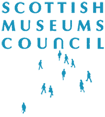
‘The Hunterian Discovery Trip’: Hunterian Museum and Art Gallery, Glasgow
This project grew from a conversation between the Hunterian’s Education Officer and the parent of a young person with Dyspraxia or Developmental Coordination Disorder (DCD). Dyspraxia affects motor skills, short-term memory, concentration, reading and writing skills. Funded by SMC, a project was developed with Richmond Park School in Glasgow to create activities for pupils of 7-11 years old. An artist, drama specialist and musician worked with staff and pupils on in-school preparatory workshops. These were followed by visits to the museum itself where the collections formed the basis for various activities. Workshops were carefully designed to meet the needs of each group, to help develop their skills and confidence.
Contact: Monica Callaghan, Education Officer 0141 330 2838
Working with Orkney Disability Forum: Orkney Islands Council
The Heritage Service on Orkney have a service level agreement with Orkney Disability Forum, to help inform their practices in relation to disabled access from a user’s point of view. The Forum have audited museum premises and temporary exhibitions, coming up with practical solutions for the development of both physical and intellectual access. In addition they have run Disability Awareness Training for council staff, but also for local independent museums who were invited to attend. In terms of best practice, this is a great example for other museum services to follow.
Contact: Steve Callaghan, Heritage Officer 01856 873 535
‘Handmade’ project: Prestongrange Museum, East Lothian
‘Handmade’ involved a collaboration between the Museums and Arts Services of East Lothian Council and was an artist in residence project. Three craft practitioners, the Museums Education Officer and the Community Arts Officer ran weekly sessions with selected groups over an 8 week period. This included: work based around the museum’s ceramic collection with a group of adults with severe learning difficulties; work with young people under threat of homelessness on wood carvings of the museum site; work with the elderly on felt panels based on historical photographs and objects. The programme opened up access to contemporary crafts and provided the opportunity to learn about local heritage. The final pieces were displayed in the museum, alongside the artists’ own works.
Contact: Peter Gray, Museums Officer 01620 828 203
Addressing the DDA in a listed building: Ullapool Museum, the Highlands
Ullapool Museum are making gradual changes to their building, exhibitions and practices to address the requirements of the Disability Discrimination Act. The museum is independent, mainly volunteer run, housed in a listed building and existing on limited funds. Nonetheless, the staff are taking a sensible approach to “reasonable adjustments” to access provision, by planning for incremental changes. This involves keeping a log of the work they have done and seeking all the necessary advice that they can from SMC, Historic Scotland, the Highland Council (with whom they have a service level agreement), access auditors, RNIB, RNID and others. They are a good example of how small independent museums can tackle their legal requirements sensibly and realistically.
Contact: Alex Eaton, Curator 01854 612 987
Textile Banner Project: Auld Kirk Museum, East Dunbartonshire
The Auld Kirk Museum collaborated with Project Ability to host workshops involving local schoolchildren and adults in the design of a textile banner. The participants had learning difficulties and some of the children were wheelchair users. Based around the theme ‘Kirkintilloch Today’ the banner highlighted significant local buildings and features. Two artists from Project Ability worked with participants to explore a range of artistic techniques, such as drawing, printing, embroidery and appliqué. The groups designed pieces within individual workshops, which were then put together to form the final piece. The banner is on display in the museum.
Contact: Peter McCormack, Curator 0141 578 0144
‘Encounters’ project: National Museums of Scotland
NMS worked in partnership with Artlink Midlothian (who facilitate disabled access to the arts) and the John Chant Centre, Penicuik (a local resource centre for adults with learning difficulties). The project grew from some initial visits to the Royal Museum in 2002, to see what art-based activities were popular with the adults involved (who ranged from young to middle-aged). This proved so productive and popular that individual art projects were worked out together with Artlink, such as dancng, video, sound recordings, visual art, etc. The participants also produced installations to go on public display in the Museum.
Contact: Christine Thompson, Education and Access Liaison Officer
0131 247 4435
